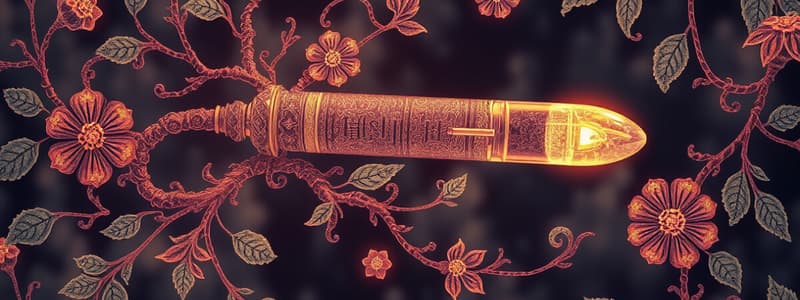Podcast
Questions and Answers
Insulin is produced by the ________ cells of the pancreas.
Insulin is produced by the ________ cells of the pancreas.
beta
When does the pancreas release insulin?
When does the pancreas release insulin?
When blood glucose levels are high
What response does a liver cell have to insulin?
What response does a liver cell have to insulin?
Taking in glucose and converting it to glycogen
What cells in the body respond to glucagon by breaking down glycogen and releasing glucose?
What cells in the body respond to glucagon by breaking down glycogen and releasing glucose?
Body cells that respond to insulin include?
Body cells that respond to insulin include?
When does the pancreas release glucagon?
When does the pancreas release glucagon?
The body's tendency to maintain relatively constant internal conditions is called ________.
The body's tendency to maintain relatively constant internal conditions is called ________.
The level of ketone bodies in the blood increases when high levels of ________ are being metabolized.
The level of ketone bodies in the blood increases when high levels of ________ are being metabolized.
In ________ diabetes, target cells do not respond normally to insulin.
In ________ diabetes, target cells do not respond normally to insulin.
In _______ diabetes, no insulin is produced.
In _______ diabetes, no insulin is produced.
In _______ diabetes, glucose levels remain higher than normal.
In _______ diabetes, glucose levels remain higher than normal.
The alpha cells of the pancreas produce?
The alpha cells of the pancreas produce?
The beta cells of the pancreas produce?
The beta cells of the pancreas produce?
When blood glucose levels rise, only insulin is released.
When blood glucose levels rise, only insulin is released.
Insulin secretion is stimulated by parasympathetic neurons.
Insulin secretion is stimulated by parasympathetic neurons.
A primary target tissue for insulin is the ________.
A primary target tissue for insulin is the ________.
What does insulin do?
What does insulin do?
What does glucagon do?
What does glucagon do?
In type 1 diabetes, a hyperglycemic hyperosmotic state may occur when?
In type 1 diabetes, a hyperglycemic hyperosmotic state may occur when?
Pre-diabetes is a condition that will likely become diabetes if eating and exercise habits are not altered.
Pre-diabetes is a condition that will likely become diabetes if eating and exercise habits are not altered.
The pancreatic hormone that raises blood glucose concentration is?
The pancreatic hormone that raises blood glucose concentration is?
________ is a condition of insulin deficiency from beta cell destruction.
________ is a condition of insulin deficiency from beta cell destruction.
________ is characterized as insulin-resistance.
________ is characterized as insulin-resistance.
The loss of water in the urine due to unreabsorbed solutes is known as?
The loss of water in the urine due to unreabsorbed solutes is known as?
After ingestion of carbohydrates in an insulin-deficient diabetic, what would happen?
After ingestion of carbohydrates in an insulin-deficient diabetic, what would happen?
The combination of type 2 diabetes, atherosclerosis, and high blood pressure is called ________.
The combination of type 2 diabetes, atherosclerosis, and high blood pressure is called ________.
Which of the following symptoms would you expect to observe in a person suffering from type I diabetes mellitus?
Which of the following symptoms would you expect to observe in a person suffering from type I diabetes mellitus?
In type 2 diabetes, insulin levels are frequently normal, yet the target cells are less sensitive to the effects of insulin.
In type 2 diabetes, insulin levels are frequently normal, yet the target cells are less sensitive to the effects of insulin.
Both insulin and glucagon are peptide hormones that target liver cells, and the responses of the target cells to these two hormones are exactly the opposite of each other.
Both insulin and glucagon are peptide hormones that target liver cells, and the responses of the target cells to these two hormones are exactly the opposite of each other.
What does gluconeogenesis refer to?
What does gluconeogenesis refer to?
The ________ rate represents the minimum energy expenditures of an individual.
The ________ rate represents the minimum energy expenditures of an individual.
Excess amino acids in the diet, that are not used to make proteins, undergo ________.
Excess amino acids in the diet, that are not used to make proteins, undergo ________.
Which pathway is the opposite of lipogenesis?
Which pathway is the opposite of lipogenesis?
What happens to excess glucose in the body?
What happens to excess glucose in the body?
How does binding of insulin to its receptor affect the cell?
How does binding of insulin to its receptor affect the cell?
Flashcards
What is insulin?
What is insulin?
Insulin is a hormone produced by beta cells in the pancreas that primarily lowers blood glucose levels.
When is insulin released?
When is insulin released?
The pancreas releases insulin when blood glucose levels rise above a certain threshold. This is a negative feedback mechanism.
What does insulin do in the liver?
What does insulin do in the liver?
Insulin promotes the conversion of glucose into glycogen, a stored form of glucose, in the liver and muscles.
How does insulin affect body cells?
How does insulin affect body cells?
Signup and view all the flashcards
What is glucagon?
What is glucagon?
Signup and view all the flashcards
When is glucagon released?
When is glucagon released?
Signup and view all the flashcards
What does glucagon cause in the liver?
What does glucagon cause in the liver?
Signup and view all the flashcards
What is homeostasis?
What is homeostasis?
Signup and view all the flashcards
What happens with high fatty acids in blood?
What happens with high fatty acids in blood?
Signup and view all the flashcards
What causes type 1 diabetes?
What causes type 1 diabetes?
Signup and view all the flashcards
What causes type 2 diabetes?
What causes type 2 diabetes?
Signup and view all the flashcards
What is a common feature of diabetes?
What is a common feature of diabetes?
Signup and view all the flashcards
What does glucagon do?
What does glucagon do?
Signup and view all the flashcards
What does insulin do to glucose metabolism?
What does insulin do to glucose metabolism?
Signup and view all the flashcards
What does glucagon do to glucose metabolism?
What does glucagon do to glucose metabolism?
Signup and view all the flashcards
What is hyperglycemic hyperosmotic state?
What is hyperglycemic hyperosmotic state?
Signup and view all the flashcards
What can pre-diabetes lead to?
What can pre-diabetes lead to?
Signup and view all the flashcards
What is osmotic diuresis?
What is osmotic diuresis?
Signup and view all the flashcards
What happens in diabetes with carbohydrate intake?
What happens in diabetes with carbohydrate intake?
Signup and view all the flashcards
What is metabolic syndrome?
What is metabolic syndrome?
Signup and view all the flashcards
What is gluconeogenesis?
What is gluconeogenesis?
Signup and view all the flashcards
What happens to excess amino acids?
What happens to excess amino acids?
Signup and view all the flashcards
How does insulin help glucose enter cells?
How does insulin help glucose enter cells?
Signup and view all the flashcards
How do insulin and glucagon act differently in cells?
How do insulin and glucagon act differently in cells?
Signup and view all the flashcards
What is basal metabolic rate?
What is basal metabolic rate?
Signup and view all the flashcards
What is beta-oxidation?
What is beta-oxidation?
Signup and view all the flashcards
Study Notes
Insulin and Blood Glucose Regulation
- Insulin is produced by beta cells in the pancreas to lower blood glucose levels.
- The pancreas releases insulin when blood glucose levels are elevated.
- Liver cells convert glucose to glycogen as part of insulin's effects.
- Body cells, including liver and most other cells, respond to insulin by taking in glucose.
Glucagon and Blood Glucose Levels
- When blood glucose levels are low, the pancreas releases glucagon to increase blood glucose.
- Liver cells respond to glucagon by breaking down glycogen and releasing glucose.
Homeostasis in the Body
- Homeostasis refers to the body's ability to maintain stable internal conditions despite external changes.
Ketone Bodies and Fatty Acid Metabolism
- High levels of fatty acids in the blood lead to an increase in ketone bodies during metabolism.
Diabetes Types and Effects
- Type 1 diabetes is characterized by no insulin production due to destruction of beta cells.
- Type 2 diabetes features insulin resistance, where target cells do not respond effectively to insulin.
- Both types of diabetes result in elevated glucose levels in the blood.
Hormones and Their Functions
- Glucagon is produced by alpha cells of the pancreas and raises blood glucose levels.
- Insulin stimulates glycolysis (glucose breakdown) and inhibits gluconeogenesis (glucose production).
- Glucagon stimulates gluconeogenesis and primarily targets the liver.
Complications and Conditions Associated with Diabetes
- Hyperglycemic hyperosmotic state in type 1 diabetes arises when plasma glucose and blood osmolarity are elevated.
- Pre-diabetes can progress to diabetes if dietary and exercise habits are not improved.
- Osmotic diuresis is the loss of water in urine due to unabsorbed solutes, common in diabetes.
Metabolic Processes
- Protein degradation and ketone production occur in insulin-deficient diabetics following carbohydrate intake.
- Metabolic syndrome refers to the combination of type 2 diabetes, atherosclerosis, and high blood pressure.
- Gluconeogenesis is the synthesis of glucose from non-carbohydrate sources like glycerol and amino acids.
- Excess amino acids are converted to glucose through gluconeogenesis when not used for protein synthesis.
Additional Insights
- Insulin causes the insertion of GLUT4 transporters into cell membranes, promoting glucose uptake.
- Both insulin and glucagon utilize different second messenger systems, leading to opposite effects on liver cells.
- The basal metabolic rate represents an individual's minimum energy expenditure at rest.
- Beta-oxidation is the metabolic process opposite to lipogenesis, where fats are broken down for energy.
Studying That Suits You
Use AI to generate personalized quizzes and flashcards to suit your learning preferences.





